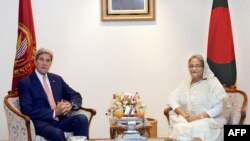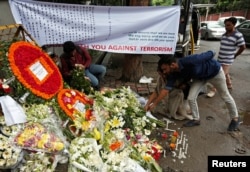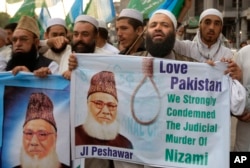Bangladesh Prime Minister Sheikh Hasina expressed a "very clear" desire to cooperate with the U.S. "very, very closely" on fighting terrorism, said Secretary of State John Kerry who announced the two countries had agreed to “additional steps by which our intelligence and law enforcement will work together to try to get ahead of this.”
Kerry, in response to a question from VOA following a speech in Dhaka, said there is evidence the Islamic State group operating in Iraq and Syria has contacts with “about eight entities around the world and one of them is in South Asia.”
Kerry added that the extremists in Iraq and Syria are in contact with some operatives in Bangladesh “and there was no argument about it” from the government officials he met with here, including the prime minister.
Sheikh Hasina’s government has been accused by regional and terrorism analysts of 'having its head in the sand' about such links, repeatedly terming the attacks as homegrown.
“I don’t believe that the government of Bangladesh has its head in the sand,” Kerry answered when questioned by VOA about this.
He added that he had a “very candid conversation” with the prime minister concerning the influences from outside on terrorism in Bangladesh.
Kerry also conveyed the sympathies and support of the United States to the South Asian country, still reeling from a July 1 attack, claimed by Islamic State, at a Dhaka cafe, which left 20 hostages dead, 17 of them foreigners.
The siege was “clearly designed to divide Bangladesh,” Kerry said in a speech at the Edward M. Kennedy Center.
Tight security
Police toting rifles, many spaced just a few meters apart, guarded the route of Kerry’s motorcade along Dhaka’s notoriously congested avenues, many of which were cordoned off while the entourage sped by.
Some motorists stood besides their vehicles in the temporarily blocked streets while clusters of onlookers stood on the sidewalks and silently watched from buildings.
The once relatively safe city has increasingly been hit by sophisticated terrorist attacks targeting foreigners, secular bloggers and other activists, as well as members of religious minorities — a worrying development in a Muslim country known for combining devotion with tolerance.
Unless there is political dialogue between the government and the opposition, “it’s going to make it nearly impossible to develop a national consensus against extremism, which is really what is threatening the country,” said Lisa Curtis, a former CIA analyst who is a senior analyst at the Heritage Foundation in Washington.
Meeting with opposition leader
Kerry, on Monday afternoon at the U.S. Embassy, also briefly met opposition leader Khaleda Zia, head of the Bangladesh National Party (BNP).
Zia, who has previously served as prime minister, is a long time rival of Hasina. The BNP and its 20-party alliance boycotted the 2014 election and its members are not part of the current Parliament.
The bitter quarrel between the two chiefs of respective Bangladeshi political dynasties -- who are known as “the battling begums” – has long cast a shadow over the country’s political system.
A third force, Jamaat-e-Islami, the country’s largest religious political party, was outlawed three years ago.
A group of U.N. human rights experts last week called on the government to annul a death sentence against a senior Jamaat-e-Islami official and re-try Mir Quasem Ali “in compliance with international standards.”
In his speech Monday in Dhaka, Kerry, referencing the human rights criticisms said “we have to uphold and not betray” democratic principles in the fight against extremism.
Jamaat leader Motiur Rahman Nizami was executed in May following his conviction for war crimes committed during the 1971 war of independence during which Bangladesh broke away from Pakistan.














